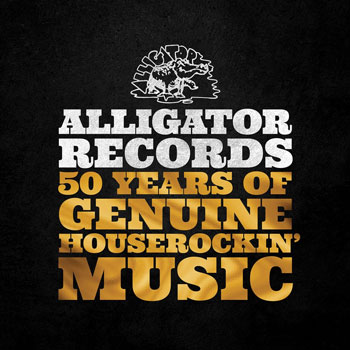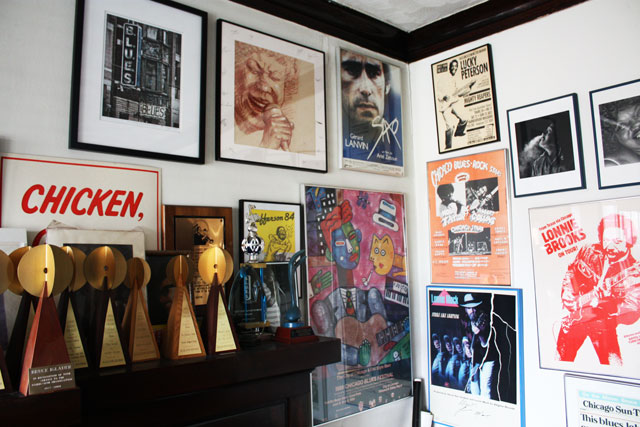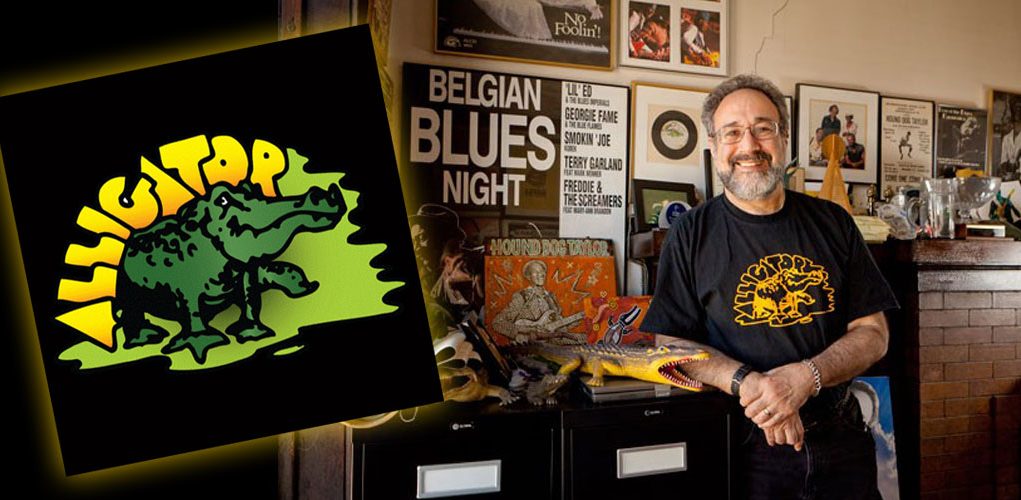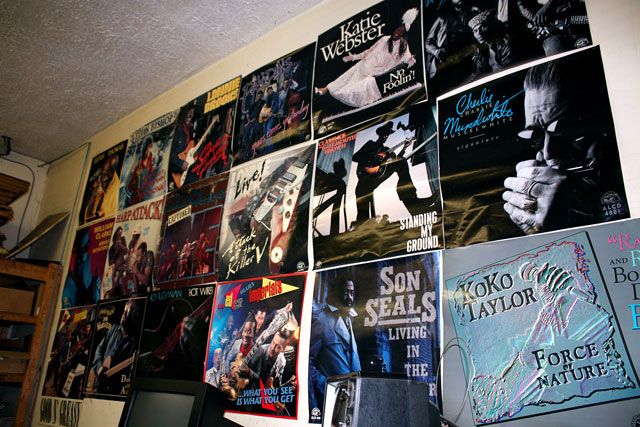https://www.alligator.com/
A LIFE IN THE BLUES: ALLIGATOR RECORDS 50TH ANNIVERSARY
Podcast Part #1
A LIFE IN THE BLUES: ALLIGATOR RECORDS 50TH ANNIVERSARY
Podcast Part #2
Alligator Records has grown into the most successful independent blues label in the world. On Friday, June 18th, Mayor Lori Lightfoot will declare “Alligator Records Day” throughout the city of Chicago. I’ve interviewed Alligator Records’ founder Bruce Iglauer twice; in the Spring of 2011 for the label’s 40th anniversary compilation, and May 30th of this year on Alligator’s 50th anniversary and the stunning 3-disc set to be released June 18th. When Bruce and I talk an enthusiastic discussion of the blues always ensues. The continuing story of Alligator Records is a fascinating one by any measure.
How did Alligator Records come to be?

Well you were a 23 year old kid just out of college, weren’t you?
Right. And I’d been in the studio a few times watching Bob, but I certainly had no other production experience.
More enthusiasm than anything else!
Knowing what the band sounded like and what they ought to sound like on records, was an important part of the way I was thinking. I want records that feel like gigs.
Yeah.
When I couldn’t talk my boss into it, I had a little inheritance and with that I recorded this band for two evenings, direct to 2-track. We mixed it as we went, just laid it down as it was being played. I paid the band and pressed up a thousand albums, and that’s how I started the company. The thing I did next was hit the road and start visiting radio stations, often sleeping in my car, just to try to create some excitement. It was a very good time for radio, and I was there at the right time with the right record.
The 50th anniversary of Alligator- it’s been a long haul.
It’s been a wonderfully productive 50 years, and wonderfully rewarding emotionally. I feel as though my work has helped a lot of musicians come forward and find their potential audiences. But most of my focus isn’t on the past. Now that I’ve done this for fifty years- as much as I hate to admit it I’m 73 years old- my commitment is finding and bringing forward artists who are going to carry the blues into the next fifty years, and who are going to be major figures in the blues over the next few generations. And that means artists who are both young but also have their own vision, even though the blues is a tradition based music. That’s why I’m so excited about having artists like Selwyn Birchwood and Christone “Kingfish” Ingram as well as some artists who are older but who are having an explosion of creativity, like Shemekia Copeland and Toronzo Cannon.
With the 50th Anniversary compilation there’s a celebratory feeling, it’s vibrant. How do you explain the blues to people who haven’t really gotten it yet?
When I came to Chicago, somebody said to me “don’t think he blues is a sad music, you listen to the blues to get rid of the blues.” Blues music came out of a very oppressed community, southern black people who were caught in this horrible economic system, it was virtual slavery. A lot of these people migrated north to Chicago, and also to Detroit and Cleveland, and Milwaukee and St. Louis. So the music came with them, and it slowly evolved. Now the tradition is worldwide, the sound of blues is well known, but the emotional effect of blues… the telling of real life stories that sometimes just are happy and danceable, but sometimes reach in and tell you about things that happen in your life that make you re-live it, and re-live some pain. So you recognize that the pain you felt when your woman or man did you wrong is something that the person at the next table felt, or the person who’s singing the song felt. I talk about the blues as being like you’re a wet sponge, and the music is wringing you out. And while you’re getting squeezed and wrung out it’s pretty uncomfortable, but afterwards it feels great. . I think the blues is different from any other kind of music I have ever heard in that people understand and are affected by it emotionally without necessarily knowing the story. As far as slow blues, well it’s certainly sensual. When I moved to Chicago, I was going to blues clubs on the south side and the west side, and unlike with the white audiences, when I was in those clubs people were dancing. Blues was dance music as well as listening music. When people dance to slow blues… well let me say it this way; Lonnie Brooks wrote a slow blues song called Belly Rubbin’ Music…
(laughing) That’s what my dad used to call it!
So people dance verrrry close together, and you knew what was on their minds so in that respect slow blues is absolutely sensual.
Let’s talk about the 50th anniversary compilation. How long did it take you to get this together and how did you go about picking the tracks?

How so?
I was trying to pick tracks from roughly 1985 to the early part of the 2000’s, and that means I was picking from (something like) 150, 175 albums. I could fit about 18 songs on each CD, of course I try to fill it as completely as I possibly could, so they’re all at least 78 minutes, and I picked mostly by gut. I picked songs that had a special meaning to me, or that I thought really showed off the artists at their very best. And of course I picked songs that I knew the artists loved. So, that one was rough. The whole assembly of the song list, including trying to find a sequence that people like you who listen from beginning to end rather than people who load it into an I Pod and listen on ‘random’, would find it flowed well, so I was listening a lot to transitions. So that whole process took about 3 months- then I had to sit down and write the booklet! (both laugh)
When I listen to the 50th compilation it feels like I’m getting all of Alligator; the feeling, the stuff you’re going for and the places you’ve been musically, from Hound Dog Taylor at the start to guys like Christone Kingfish Ingram and Toronzo Cannon at the other end and everything in between. It represents the label really well.
Well thank you for that. The other anniversary collections (20, 30, 40, etc) were 2 CD’s (and) in the earlier ones the cd’s wouldn’t hold as much music, so it was a shorter number of songs per disc. This one is 3, a jam-packed 78 minutes each… I had more opportunity to include more music, but I’m still very aware of what I left off and I feel bad that I didn’t represent artists like Floyd Dixon, for example, and I wish that I’d had space.
Maybe at some point you could consider an Alligator Records box set.
I considered that for this project, but I wanted to keep the price for the consumers as reasonable as I possibly could. In fact in the 3-cd version and the 2 LP sort of ‘best of the best’ version that’s coming out as well, I priced them so that hopefully everyone could afford them- they’re budget priced.
In the 50 years that Alligator Records has been fiercely independent, have any of the majors come after you and tried to absorb the label?
Over the years we’ve had a few feelers from significantly bigger companies. The most aggressive one came some years ago from the A&M label back when it was more of a force in the marketplace. And that was during a time when there was a burst of interest in blues rock guitar, partly because of Stevie Ray Vaughan, who was essential in turning new fans onto blues. And, by the way, one of the humblest, nicest guys I’ve ever met.
Oh cool!
I had a meeting with A&M because I thought it would be great to have their power in the marketplace and their deep pockets and their marketing know how because I could reach more people. I could not only make more sales, but make more fans. I realized very quickly in the meeting that they weren’t interested in my catalog of what at that point was probably 70 or 80 albums, they were interested in whether I could find the next Stevie Ray Vaughan, they just wanted a hot guitar player. I said “no”, and within 2 years, every single person I was talking to at A&M was gone.
That tells you something, doesn’t it?
Well the major labels have a lot of turnover and that’s because if you work for a major label and you’re doing anything that involves choosing artists or choosing music, you’re as job-secure as whatever your last hit was. So if you don’t deliver successful record after successful record, you’re gonna be unemployed.

I want Alligator to be there to continue to record songs that are relevant to contemporary audiences now, contemporary audiences in 20 years, 30 years, in 40 years. I’ve done this for 50 years, my mind is to do it for another 50 years… but just incase that doesn’t work out quite that way, I want to make sure that I’ve found the artists and have nourished the careers of the artists that will carry the blues forward for the next 50 years. I will continue to nurture and support the artists who are with the label now, and artists who are quality interpreters of traditional blues, but the most important thing to find is those new visionaries. Like I’m seeing with Christone Ingram, Selwyn Birchwood, and slightly older artists like Shemekia Copeland and Toronzo Cannon, who are informed by and love the tradition but aren’t trying to repeat it, they’re using it as a foundation to make their own statements and NOT stick to 12 bars and 3 chord changes and rhythms that go ba-bump, ba-bump, ba-bump, and not trying to write about the same old stuff. That’s the future of the blues; otherwise it will become a museum piece and I don’t want that to happen.
“Alligator Records: 50 Years of Genuine Houserockin’ Music” will be available as June 18th as 3CD and 2LP sets, and it will also be on your usual digital platforms.
“Bitten By The Blues: The Alligator Records Story” by Bruce Iglauer and Patrick A. Roberts is available through your favorite bookstores. I bought a digital copy for my Kobo reader the day it came out.








